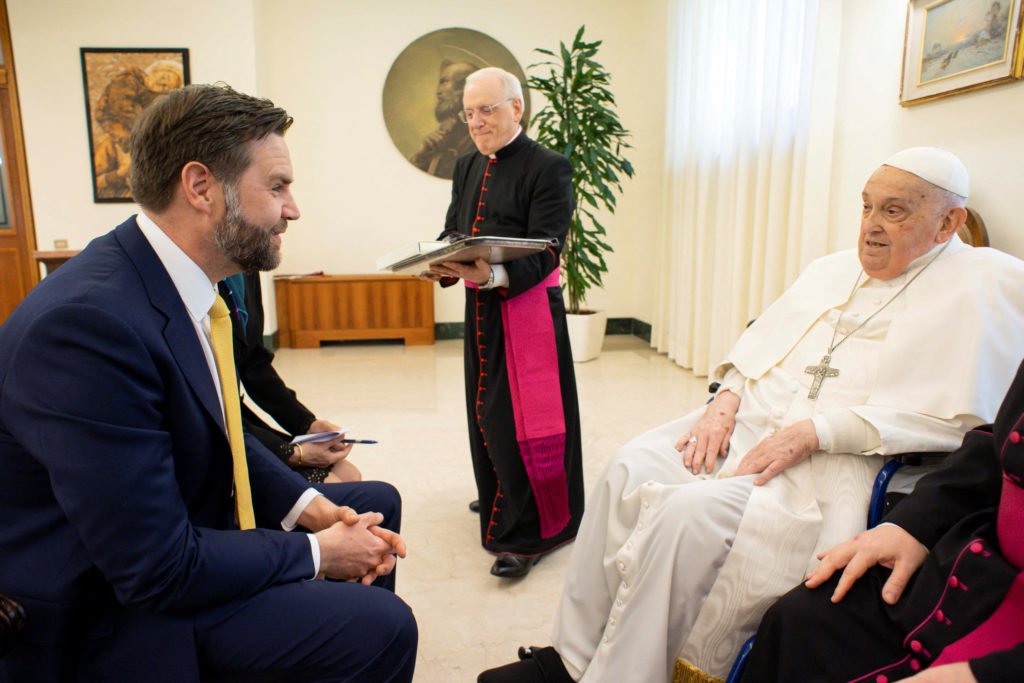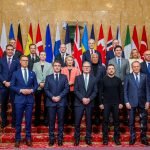
The Intersection of Faith and Politics: A Modern Dilemma.
This blog explores the clash between Pope Francis’s compassionate Catholicism and the political maneuvering of JD Vance, examining faith, immigration, and the ethical contradictions of right-wing leadership. It highlights the moral divide between genuine Christian values and political rhetoric.
The complex relationship between religion and politics, examining recent commentary on immigration policies, Christian nationalism, and the moral dilemmas faced by contemporary conservatives.
In a world where politics often intertwines with personal beliefs, the recent visit of JD Vance to Pope Francis and the subsequent controversies surrounding both figures have sparked heated debates. It’s a curious spectacle when a Pope lauded for his compassion meets a politician representing polarizing views. With Vance’s fraught ties to the Trump administration, one can’t help but ponder deeper implications for both Christianity and modern governance. Can the two coexist, or are they bound to clash?
The Controversial Legacy of Pope Francis
Pope Francis has become a pivotal figure in the Catholic Church, known for his progressive views and calls for compassion. His legacy is marked by a strong emphasis on supporting marginalized communities. However, this approach has not come without its critics. Many conservative Catholics have voiced their discontent, viewing his liberal stance as a departure from traditional Church teachings.
Pope Francis’s Call for Compassion Towards the Marginalized
At the heart of Pope Francis’s message is a profound call for compassion. He has consistently urged the Church to reach out to those who are often overlooked or marginalized. This includes the poor, the homeless, and immigrants. His Holiness advocated for understanding, compassion, and empathy towards all people regardless of their background. This message resonates deeply with many who feel alienated by society.
But why is compassion so crucial? In a world filled with division and strife, compassion serves as a bridge. It connects people, fostering understanding and acceptance. Pope Francis believes that the Church should be a sanctuary for all, not just for those who fit a certain mold. His approach challenges the Church to reflect on its role in society and to embrace those who are often cast aside.
Criticism from Conservative Catholics
Despite his compassionate message, Pope Francis has faced significant backlash from conservative factions within the Church. Many conservative Catholics argue that his views are too liberal. They feel that he strays from traditional teachings, particularly on issues like sexuality and family values. This criticism highlights a growing divide within the Church.
- Some conservatives believe that the Pope’s focus on social issues undermines the Church’s spiritual mission.
- They argue that his liberal stance could lead to confusion among the faithful.
- Critics often cite specific instances where they feel the Pope has compromised on core Catholic doctrines.
This tension raises an important question: Can the Church evolve while still maintaining its foundational beliefs? Pope Francis seems to think so. He advocates for a Church that is both relevant and rooted in compassion. However, this vision is met with resistance from those who fear change.
Significance of His Stance on Immigration Issues
One of the most significant aspects of Pope Francis’s legacy is his stance on immigration. He has been a vocal advocate for the rights of immigrants, often highlighting their struggles and the need for humane treatment. In a world where immigration is a contentious issue, his voice stands out.
His approach is particularly relevant in the context of recent political climates. For instance, during discussions surrounding immigration policies in the United States, Pope Francis’s message of compassion often contrasts sharply with the rhetoric used by some political leaders. This disconnect is evident in the way immigration is framed in public discourse.
Consider the recent commentary surrounding JD Vance’s visit with Pope Francis. Following their meeting, Vance tweeted an Easter message that sparked debate. Critics pointed out the irony of discussing compassion while supporting policies that many view as cruel. This highlights the ongoing struggle between the Pope’s message and the actions of some political figures.
In a world where undocumented immigrants are often labeled as criminals, Pope Francis’s emphasis on compassion serves as a reminder of their humanity. He challenges the narrative that dehumanizes these individuals, urging society to see them as people deserving of dignity and respect.
The Disconnect Between Conservative Views and Compassion
Recent discussions have revealed a significant disconnect between conservative views and the Pope’s compassionate approach. Many conservative Catholics feel that the Pope’s liberal perspectives do not align with their beliefs. This has led to a growing rift within the Church.
For example, some conservative factions have criticized the Pope for his stance on immigration, arguing that it undermines national security. They often cite concerns about illegal immigration and its impact on society. However, Pope Francis counters this by emphasizing the moral imperative to care for those in need.
This ongoing debate raises an important question: How can the Church bridge this divide? Pope Francis seems to believe that dialogue and understanding are key. He encourages open conversations about faith, compassion, and the challenges facing society today.
Pope Francis’s legacy is undeniably complex. His call for compassion towards the marginalized has resonated with many, yet it has also drawn criticism from conservative Catholics. His stance on immigration issues highlights the tension between traditional beliefs and the need for a more compassionate approach. As the Church navigates these challenges, the question remains: Can it find a way to embrace both compassion and tradition?
Reflections on Recent Events: The Intersection of Faith, Politics, and Morality
In a world where politics and faith often collide, recent events have sparked significant discussions. The visit of JD Vance to Pope Francis, followed by the Pope’s death just hours later, has left many pondering the implications of this encounter. Pope Francis was known for his controversial yet compassionate stance on various issues, particularly regarding marginalized groups. His approach often drew criticism from conservative factions within the Catholic Church, who viewed him as too liberal. This situation raises questions about the role of faith in political discourse and the moral responsibilities of leaders.
The Pope’s Legacy and Compassion
Pope Francis consistently advocated for compassion and support for those in need. He emphasized the importance of kindness, especially towards immigrants. This perspective is crucial, especially in today’s political climate, where immigration policies are often harsh and unforgiving. The Pope’s legacy is one of empathy, a stark contrast to the rhetoric often employed by political figures.
Following his visit with the Pope, JD Vance tweeted an Easter message that sparked a notable response. He wrote, “Happy Easter patriot,” which was met with a counterpoint from Grock, an AI created by Elon Musk. Grock’s response highlighted a critical issue: under Trump’s strict immigration policies, even Jesus, if undocumented, could have faced deportation. This statement ignited a debate about the implications of such policies and their moral ramifications.
Immigration Policies and Moral Dilemmas
The discussion surrounding immigration is not just about policies; it’s about the people affected by them. The Trump administration’s approach to immigration has often prioritized the removal of undocumented individuals, raising ethical questions. How can a nation that prides itself on being a refuge for the oppressed turn its back on those seeking safety?
Critics argue that labeling undocumented immigrants as criminals overlooks the humanity of these individuals. They are often fleeing violence, poverty, and persecution. The juxtaposition of Trump’s policies with the teachings of compassion espoused by figures like Pope Francis creates a stark moral dilemma. It begs the question: what does it mean to be a nation of immigrants if we fail to uphold the values of kindness and empathy?
The Hypocrisy of Political Leaders
Moreover, the conversation delves into the moral duplicity exhibited by some political leaders. Donald Trump, often characterized as a “baby Christian” by his supporters, has faced scrutiny for his lack of devoutness. This characterization raises eyebrows, especially when considering the values that many Christians hold dear. How can one claim to embody Christian values while engaging in actions that seem to contradict those principles?
Trump’s Easter message, which included references to “radical left lunatics,” was seen by many as a projection of his own administration’s issues. Critics noted that this rhetoric often serves to distract from the real problems at hand. The portrayal of undocumented immigrants as criminals is a prime example of this tactic. It shifts the focus away from the moral failings of those in power and onto vulnerable populations.
Family Values and Public Personas
The personal lives of figures within the Trump camp also reveal a troubling pattern. Infidelity and questionable family values seem at odds with their public personas. This contradiction raises further questions about the authenticity of their claims to uphold Christian values. Are they truly representing the teachings of Christ, or are they merely using religion as a tool for political gain?
The Role of Media in Shaping Narratives
The media plays a significant role in shaping public perception. Outlets like Fox News have been criticized for normalizing figures like Vladimir Putin, who, despite attending Easter services, engage in violent and oppressive actions. This normalization creates a dangerous precedent, where religious actions are presented as virtuous, regardless of the underlying cruelty.
The emergence of a harmful cycle of religious patriarchy and the failure to acknowledge wrongdoing among powerful figures is a central problem in American society today. It raises the urgent need for a collective move toward compassion and social justice. As the narrative unfolds, it becomes clear that the intersection of faith and politics requires a critical examination of the values we uphold.
Countering Misinformation with Technology
In this landscape, technology has emerged as a counter-propaganda tool. Grock, the AI created by Elon Musk, serves as a reminder of the importance of questioning narratives that are often taken at face value. It highlights the tension between faith and the violent rhetoric espoused by some factions within the far-right. This tension underscores the need for a more compassionate approach to political discourse.
The recent events surrounding JD Vance’s visit to Pope Francis and the subsequent discussions about immigration policies, moral duplicity, and media narratives reveal a complex interplay between faith and politics. As society grapples with these issues, it is essential to reflect on the core values that should guide our actions. Compassion, empathy, and a commitment to social justice must take precedence over divisive rhetoric and political gain. The legacy of leaders like Pope Francis serves as a reminder of the importance of kindness in a world that often seems devoid of it. As we move forward, the call for a more compassionate society becomes ever more urgent.
TL;DR: This post delves into the contentious intersection of faith and politics today, highlighting the conflicts within religious conservatism and ethical leadership.
MAGAHypocrisy, ReligiousValues, JDVance, TrumpAdministration, PopeFrancis, ImmigrationPolicies, ChristianNationalism
#MAGAHypocrisy, #ImmigrationPolicies, #ReligiousValues, #JDVance, #ChristianNationalism, #TrumpAdministration, #PopeFrancis,#FaithAndPolitics, #PopeFrancis, #JDVance, #ImmigrationCrisis, #ChristianNationalism, #ReligiousHypocrisy, #CatholicChurch, #TrumpEra, #SocialJustice, #MoralLeadership

